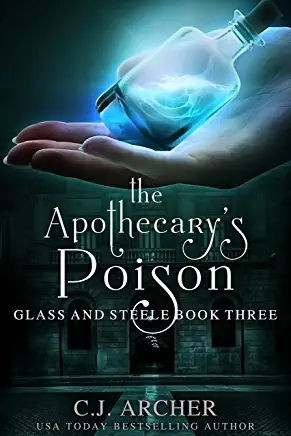The Glass and Steele series by C.J. Archer
There are thirteen or fourteen novels in this cosy fantasy-detective series, and I've read the six pictured above. I actually started reading Archer's spin-off series, 'The Glass Library Series', but thought I should read the Glass and Steele series to find out what happened to the previous generation of characters.
It is a testament to the strength of my OCD tendencies that I am still reading this series, as they aren't really my kind of thing. Don't get me wrong: I love a bit of daft historical fantasy, and throwing in a bit of sexy romance and detective work only adds to their appeal. However, they aren't a patch on Jodi Taylor's Chronicles of St Mary's or Time Police books. They're more akin to Liz Hedgecock's historically-set novels.
India Steele is a watchmaker's daughter who doesn't at first realise that she's also a magician. In this world, set in an alternative Victorian London, magic is initially something that is kept hidden for fear of retribution from the powerful trade guilds. As the series continues, magic becomes increasingly prominent and the series, I expect, is partly the story of how it emerges from the shadows and becomes part of mainstream life (as it is in the Glass Library series).
As the first book opens, India's father has died leaving her an orphan and she has been tricked out of her inheritance by a nefarious fiance. After a chance encounter, she starts working for the extraordinarily handsome and charming Matthew Glass, heir to the Ryecroft fortune, who has been brought-up abroad, mostly in the USA. Implausibly, his father married a member of a Californian Wild West clan of outlaws, and he was himself something of an outlaw for a time until he began working undercover for the law. Matt is in England searching for two magicians who saved and prolonged his life after he was shot. The watch into which their magic was infused is no longer working effectively so he needs to get it mended or renewed or he will die.
Each novel in the series contains an individual detective story in which India and Matt usually solve the case, often putting themselves at great risk. The stories overlap and pick up bits of plot and characters from previous episodes. In a series full of implausibilities, one of the biggest is how India finds herself living in Matt's posh London townhouse, along with his eccentric posse and his elderly snobbish aunt.
One ongoing theme is the romance between the two central characters. I'm not a fan of romances, unless they are very well-written and engaging. The romance between India and Matt suffers from being stretched over numerous novels, and from being conducted by two characters who are stereotypical and who seem to have a narrow range of attributes, all of which have been rehearsed to death by book six. India is a bit more interesting than Matt, but the romantic bits make me cringe, if I'm honest. Matt is always brushing his thumb against India's skin - her lips or cheek or jawline or wrist or arm - which I am finding increasingly irritating. He has a mischievous grin which excites India, apparently, which we are reminded of on a regular basis. They still haven't had sex - don't they realise they're halfway through the series now?
Archer has some writing tics too which I find irritating. Characters often smile 'flatly' or their lips 'flatten' or they give a 'flat' smile. I can't visualise this. Do lips flatten? I've been watching people in real life to see and I can't say I've noticed lips flattening except maybe in a rictus of horror. There is generally too much reliance on cliched phrases and overlong stretches of expositional dialogue, and the plots themselves, though often dramatic, seems weirdly dull. They are often simultaneously implausible and boring.
There are lots of things in these stories to grip a reader who enjoys a bit of undemanding cosy adventure. There are unusual characters - such as Willie (think Calamity Jane transposed to Victorian London), or Cyclops (a huge, black, one-eyed friend of Matt's). Archer does the mandatory diversification thing that all novelists of this kind tend to do - there are characters from other cultures, the women are much more feisty and determined to assert their independence than most women were at the time and place the stories are set, the central characters, even the bourgeoise India, are oddly open-minded about homosexuality. This stuff is unconvincing but good fun to read. But the basic plotline is stretched thin in a way that is beginning to feel like Archer was under pressure to extend the series as far as possible in order to maximise her income from it. I don't blame her. If you hit on a series which people want to buy, you obviously want to keep the wagon rolling as long as possible. Unfortunately, so far, this particular wagon is not being kept rolling by imagination, ingenious plot twists and lively characterisation, like Jodi Taylor's novels, for instance. It is beginning to feel like simply more of the same.
*** Ok but nothing special.






No comments:
Post a Comment